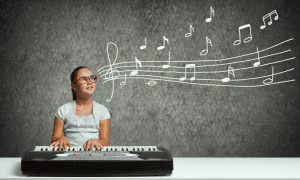Are you just starting your journey to learn how to play the piano? Or perhaps you’ve been struggling to improve your piano playing skills?
As a beginner, it’s normal to face challenges when practicing, but knowing the common mistakes can help you avoid setbacks and accelerate your progress.
In this article, we’ll look at three of the most frequent mistakes that piano learners make and how to fix them so you can master piano faster and get the most out of your practice time.
#1 They Practice at the Wrong Times
When is the time of day you feel most active? Is it the morning? The evening? For me, it’s 3 PM in the afternoon. I don’t know why, but that’s when my body kicks into action, and I just want to get things done. 3 PM ends up being my piano practice time most days because my mind is fresh, and I can go through longer bouts of practice without feeling sluggish.
If I force myself to practice in the morning, it’s just not going to happen. I have trouble concentrating, and it becomes a slog. However, once 3 PM hits, I’m ready to hit the keys, and everything seems to click.
Finding the best time for you to practice piano efficiently is crucial. Ask yourself when you’re most alert and avoid times when you feel drained. It could be weekends at 11 AM, or perhaps evening hours work best for you. The key is to align your practice sessions with when your mind is sharpest.
By optimizing your practice times, you can get more out of a 20-minute practice session than you would from a tired and distracted hour-long one. This can be particularly helpful for those learning the piano online or taking part in a piano for beginners course.
#2 They Play What They Already Know
To truly learn how to play piano, it’s important to practice the hardest parts of your music first. A big mistake many beginners make is wasting time by playing things they are already comfortable with. While it can feel good to play something you already know, it doesn’t push you forward.
Instead, try starting your practice with the most difficult sections or new scales, chords, or songs you are learning. When your brain is fresh, you can better tackle the hard parts, such as complex piano chords for beginners or tricky passages in a song. Save the easier, familiar pieces for the end of your session, as a reward for getting through the tough parts.
This method can help you make faster progress and move beyond basic piano lessons, advancing to more intermediate and challenging pieces. Practicing piano smartly involves targeting weaknesses first and building up from there.

#3 They Don’t Set Deadlines
One of the most important tips for beginner piano players is to set small, manageable goals.
You’d be surprised how much you can accomplish in just 5 minutes of focused, daily practice. Instead of tackling an entire piece of music, break it down into small sections.
For example, “Today, I’m going to learn measures 34-40” or “I’m going to nail the transition at minute 1:26 of this song.” Use a timer and give yourself just 5 or 10 minutes to work on that section. If you’re focused, that short amount of time will be incredibly productive. If you can play something three times in a row without mistakes, you can move on. Expanding your practice time gradually—starting with short sessions and eventually working up to 20 or 30 minutes—can build consistency and keep you from feeling overwhelmed.
If you’re following an online piano learning method, like those found in popular piano tutorials for beginners, setting clear deadlines will help keep you on track and motivated. This structured approach will ensure that you don’t just sit down and play aimlessly but are instead making measurable progress toward becoming a better pianist.
By avoiding these three common mistakes, you’ll be on the right track to improving your piano playing skills. Whether you’re a beginner learning through piano lessons online or a self-taught pianist, being mindful of these errors will help you practice more effectively. Happy practicing!




